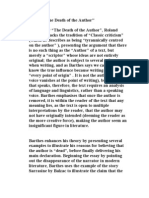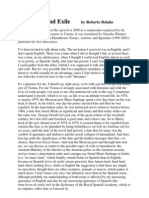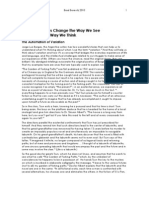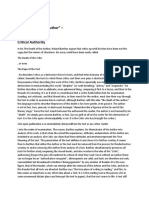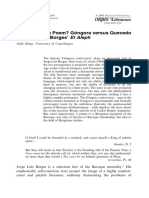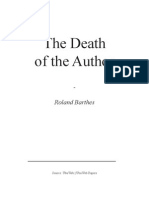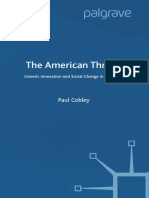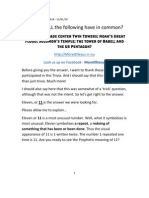The Literature of Exhaustion by John Barth
The Literature of Exhaustion by John Barth
Uploaded by
Alexandra GherasimCopyright:
Available Formats
The Literature of Exhaustion by John Barth
The Literature of Exhaustion by John Barth
Uploaded by
Alexandra GherasimOriginal Title
Copyright
Available Formats
Share this document
Did you find this document useful?
Is this content inappropriate?
Copyright:
Available Formats
The Literature of Exhaustion by John Barth
The Literature of Exhaustion by John Barth
Uploaded by
Alexandra GherasimCopyright:
Available Formats
The literature of exhaustion by John Barth
The essay The literature of exhaustion written by the American novelist John Barth appeared in 1967, and it is considered to be the manifest of postmodernism. Barth explains that by exhaustion he does not mean anything so tired as the subject of physical, moral, or intellectual decadence, only the used-upness of certain possibilities. From his point of view, if an artist doesnt keep up with the present, with the reality that surrounds us, with all the new technologies and concerns, he is doomed to literary failure. He says that art and its forms live in history and certainly do change; he focuses his essay on this change, providing various examples of authors and works that succeeded adjusting in character to present times without losing their artistic charm. By far, he has a great admiration for the Argentine writer Jorge Luis Borges. He seems particularly fascinated by his story Pierre Menard, author of the Quixote. The story is about a turn-of-the-century French Symbolist who produces, not copies or imitates, but actually composes several chapters of Cervantes' novel. Borges brings up issues as diverse as the death of the author, intellectual property rights, and the historical specificity of aesthetic and cognitive modes. What impresses Barth is that Borges reuses Cervantes' novel in order to produce a "remarkable and original work of literature, the theme of which is the difficulty, perhaps the unnecessity, of writing original works of literature. His artistic victory, if you like, is that he confronts an intellectual dead end and employs it against itself to accomplish new human work". I found really interesting his example from The 1001 Nights, inspired also by Borges. It is about the 602nd night, when, owing to a copyists error, Scheherezade begins to tell the King the story of the 1001 nights, from the beginning. If the King didnt interrupt her, thered be no 603 rd night ever, and while this would solve Scheherezades problem which is every storytellers problem: to publish or perish it would put the outside author in a bind. According to Barth, the contemporary writer resembles Scheherezade, whose life depends on her ability to entertain the king with old stories made new. Like her, contemporary writers assume the task of creating new stories through the retelling of the old. The literature of exhaustion is shorthand for the belief that every story has already been written, already been told, and that the only new thing a writer can do is to refashion the old stories. Borges is interested in the 602nd night because its an instance of the story-within-the-story turned back upon itself, and his interest in such instances is threefold. First, as he himself declares, they disturb us metaphysically: when the characters in a work of fiction become readers or authors of the fiction theyre in, were reminded of the fictitious aspect of our own experience [...] Second, the 602nd night is a literary illustration of the regressus in infinitum [...] Third, Scheherezades accidental gambit, like Borgess other
versions of the regressus in infinitum, is an image of the exhaustion, or attempted exhaustion, of possibilities in this case literary possibilities. Barth also mentions an interesting thing about Borges, namely his fascination for labyrinths (his most substantial translated volume is called Labyrinths). He says that a labyrinth, after all, is a place in which, ideally, all the possibilities of choice (of direction, in this case) are embodied, and barring special dispensation like Theseuss must be exhausted before one reaches the heart. Where, mind, the Minotaur waits with two final possibilities: defeat and death or victory and freedom [...] Its a heroic enterprise, with salvation as its object. He also states that Theseus in the Cretan labyrinth becomes in the end the aptest image of Borges after all, showing in very subjective way his admiration for Borges, comparing him with a myth. Even if he refers to his favorite author, I found this comparison between a labyrinth and literature itself very profound and explicit for his attempt to explain the exhaustion which he talks about. In my opinion, this essay its very well written, and I gave the exampl es which I found interesting and relevant. I cannot say I totally agree with all its been written in it, but there are a lot of ideas which worth reading and discussing. As a conclusion, I agree that there are no new ideas left in the world, but I dont think that there are no new ways in which to present the ideas that already exist. No one, according to Barth, has the possibility of originality anymore; the material and formal conventions of writing (and of other activities) have limits, and we have finally come to them. Authors are struggling with the idea that there is nothing to write that hasn't already been written, but here I disagree because I think that if someone wants bad enough to accomplish something original and outstanding, that someone will succeed by means of hard work and healthy imagination.
You might also like
- Simplified Anatomy For The Comic Book ArtistDocument163 pagesSimplified Anatomy For The Comic Book ArtistGutto Paixão94% (34)
- ADocument2 pagesAHanuren T15% (13)
- Analysis of Death of The AuthorDocument13 pagesAnalysis of Death of The Authorarghyapikai89% (9)
- A Modern Master Paul de ManDocument7 pagesA Modern Master Paul de Manziggy00zaggyNo ratings yet
- Read Ebook (PDF EPUB) Other Inquisitions 1937-1952 by Jorge Luis BorgesDocument6 pagesRead Ebook (PDF EPUB) Other Inquisitions 1937-1952 by Jorge Luis BorgesKabron KikhabarNo ratings yet
- Read Ebook (PDF EPUB) Other Inquisitions 1937-1952 by Jorge Luis BorgesDocument6 pagesRead Ebook (PDF EPUB) Other Inquisitions 1937-1952 by Jorge Luis BorgesKabron KikhabarNo ratings yet
- An Analysis of Jorge Luis BorgesDocument5 pagesAn Analysis of Jorge Luis BorgesTarang Gupta100% (1)
- Lost in The Funhouse (Life-Story)Document6 pagesLost in The Funhouse (Life-Story)Carmen VoicuNo ratings yet
- How to Read Novels Like a Professor: A Jaunty Exploration of the World's Favorite Literary FormFrom EverandHow to Read Novels Like a Professor: A Jaunty Exploration of the World's Favorite Literary FormRating: 4 out of 5 stars4/5 (149)
- JD Edwards - Address BookDocument288 pagesJD Edwards - Address BookToronto_ScorpionsNo ratings yet
- Er Ist Wieder Da (Document2 pagesEr Ist Wieder Da (gyorgyorbanNo ratings yet
- Rolemaster - Angmar Land of The Witch KingDocument2 pagesRolemaster - Angmar Land of The Witch KingSincerus RenatusNo ratings yet
- (Dan McIntyre) Point of View in Plays A CognitiveDocument217 pages(Dan McIntyre) Point of View in Plays A CognitiveRamdhan Aji Nurcahya100% (1)
- Newspaper ProductionDocument10 pagesNewspaper ProductionJaya Porsche Ignacio Alegarbes67% (3)
- Politics - According To The Bible by Wayne Grudem, ExcerptDocument52 pagesPolitics - According To The Bible by Wayne Grudem, ExcerptZondervan100% (9)
- Literature and Exile by Roberto BolañoDocument5 pagesLiterature and Exile by Roberto BolañoPaul HoulihanNo ratings yet
- Only DaughterDocument6 pagesOnly Daughtersitamangala100% (1)
- Phần 4 - bài dịch môn Các trào lưu văn học.Document3 pagesPhần 4 - bài dịch môn Các trào lưu văn học.Hân Nguyễn Thị NgọcNo ratings yet
- Barth & BorgesDocument15 pagesBarth & BorgesDeborah Roman100% (1)
- Guia (Las Ruinas Circulares)Document28 pagesGuia (Las Ruinas Circulares)Carlos RoderoNo ratings yet
- Jorge Luis Borges - SpinozaDocument13 pagesJorge Luis Borges - SpinozaLasha100% (1)
- Death of The AuthorDocument4 pagesDeath of The AuthorGamer 4 Life (MarwatKnight)No ratings yet
- Death of The AuthorDocument14 pagesDeath of The Authorfatima zohra khelifi100% (1)
- BorgesDocument8 pagesBorgesJohn MunyaoNo ratings yet
- Nirmal Verma On Borges I AM LOST SOMEWHEREDocument8 pagesNirmal Verma On Borges I AM LOST SOMEWHEREthinksphereupNo ratings yet
- Roland Barthes - Death of The AuthorDocument6 pagesRoland Barthes - Death of The Authorjas2012100% (1)
- The Death of Roland BarthesDocument6 pagesThe Death of Roland BarthesRoss Macleay100% (1)
- Barthes Death of The AuthorDocument4 pagesBarthes Death of The AuthorwnparrottNo ratings yet
- The Death of The AuthorDocument9 pagesThe Death of The AuthorSamarth Bhagwat75% (4)
- Stougaard-Nielsen 16 Stougaard - The AuthorDocument18 pagesStougaard-Nielsen 16 Stougaard - The AuthorrcasanigonzalezNo ratings yet
- Roland Barthes The Death of The AuthorDocument3 pagesRoland Barthes The Death of The AuthorDijana Petkovic100% (1)
- Essay City of GlassDocument2 pagesEssay City of GlassMaxi YañezNo ratings yet
- BARTHES. The Death of The AuthorDocument7 pagesBARTHES. The Death of The AuthorbplapresentacaoNo ratings yet
- University of Pennsylvania PressDocument16 pagesUniversity of Pennsylvania PressLeo RuilovaNo ratings yet
- "Spirits To Enforce, Art To Enchant": Metatheatricality and Art in The Tempest and Hag-Seed Yağmur TatarDocument10 pages"Spirits To Enforce, Art To Enchant": Metatheatricality and Art in The Tempest and Hag-Seed Yağmur TatarKristy LamNo ratings yet
- The Death of The AuthorDocument3 pagesThe Death of The AuthorOla PowalkaNo ratings yet
- Barthes The Death of The AuthorDocument7 pagesBarthes The Death of The AuthorSbar BarNo ratings yet
- Death AuthorbarthesDocument6 pagesDeath AuthorbarthesisabelmarcosNo ratings yet
- An Unwritten NovelDocument4 pagesAn Unwritten NovelJaylyn MendozaNo ratings yet
- A Note On The TranslationDocument4 pagesA Note On The TranslationEvelin D'AngeloNo ratings yet
- John BarthDocument24 pagesJohn BarthMilina Jovanovic100% (1)
- Borges Translation Kristal IntroDocument15 pagesBorges Translation Kristal IntroDaniel Aguirre OteizaNo ratings yet
- Two Microcosmic WorldsDocument11 pagesTwo Microcosmic WorldsKevin YangNo ratings yet
- Barthes,.Roland. .The - Death.of - AuthorDocument4 pagesBarthes,.Roland. .The - Death.of - AuthorMilica MartinovićNo ratings yet
- An Unwritten Novel: Fernando Pessoa's The Book of DisquietFrom EverandAn Unwritten Novel: Fernando Pessoa's The Book of DisquietNo ratings yet
- Hart David J. - The Man Who Would Be QuainDocument10 pagesHart David J. - The Man Who Would Be QuainIncógnitaNo ratings yet
- Barthes, Death of The AuthorDocument5 pagesBarthes, Death of The AuthorJQNo ratings yet
- Roland Barthes: TR' Tr. TRDocument4 pagesRoland Barthes: TR' Tr. TRuneaieNo ratings yet
- 2Document2 pages2japonpuntocomNo ratings yet
- Barthes, Roland - The Death of The AuthorDocument3 pagesBarthes, Roland - The Death of The AuthorstajpiNo ratings yet
- Thinkings 1 VariationDocument5 pagesThinkings 1 VariationBrad BorevitzNo ratings yet
- Death of The Author Summery1Document3 pagesDeath of The Author Summery1Ratan Roy100% (1)
- Translation As MetaphorDocument5 pagesTranslation As Metaphormeropizaw100% (1)
- Roland BarthesDocument8 pagesRoland BarthesJessareth CapacioNo ratings yet
- The World in A Poem? Go Ngora Versus Quevedo in Jorge Luis Borges' El AlephDocument20 pagesThe World in A Poem? Go Ngora Versus Quevedo in Jorge Luis Borges' El AlephLeo RuilovaNo ratings yet
- BarthesDocument6 pagesBarthesericaNo ratings yet
- English Midterm Review SheetDocument6 pagesEnglish Midterm Review SheetAdam ZhangNo ratings yet
- HobbesDocument3 pagesHobbeschanbanNo ratings yet
- PDFDocument10 pagesPDFCristina MandoiuNo ratings yet
- Life-Story: Metafiction "Metafiction" Is "A Term Given To Fictional Writing Which Selfconsciously andDocument3 pagesLife-Story: Metafiction "Metafiction" Is "A Term Given To Fictional Writing Which Selfconsciously andNoemiKissNo ratings yet
- The Death of An Author Roland BarthesDocument6 pagesThe Death of An Author Roland BarthesNicholas Andrew FieldsNo ratings yet
- Borges - BiografijaDocument178 pagesBorges - Biografijaanastanicstanki100% (1)
- The American Thriller Generic Innovation and Social Change in The 1970s PDFDocument252 pagesThe American Thriller Generic Innovation and Social Change in The 1970s PDFLoulou PirouNo ratings yet
- Thesis Average Word CountDocument4 pagesThesis Average Word Countvsiqooxff100% (2)
- PB - 001-E JW Bible Public TalkDocument2 pagesPB - 001-E JW Bible Public TalkJW M SharpNo ratings yet
- Jinx Summer Extra 1936Document28 pagesJinx Summer Extra 1936Maarten Bosmans100% (1)
- At School With MafaldaDocument2 pagesAt School With Mafalda4gen_3No ratings yet
- 7th Sem Reports' FormatsDocument2 pages7th Sem Reports' FormatsAnimesh Kumar JhaNo ratings yet
- Middle Earth ElvishDocument9 pagesMiddle Earth ElvishIno-san Yamanaka100% (1)
- Verb Tense Practice TestDocument5 pagesVerb Tense Practice TestRenata ScrinziNo ratings yet
- Fine Art - March 2021Document21 pagesFine Art - March 2021ArtdataNo ratings yet
- The Proper Format For EssaysDocument3 pagesThe Proper Format For EssaysLeoParadaNo ratings yet
- Josephus The Bible and HistoryDocument476 pagesJosephus The Bible and HistoryDavid Bailey100% (7)
- What Does Noah's Flood, The World Trade Center Twin Towers, The Tower of Babel, The U.S. Pentagon and King Solomon All Have in Common?Document10 pagesWhat Does Noah's Flood, The World Trade Center Twin Towers, The Tower of Babel, The U.S. Pentagon and King Solomon All Have in Common?http://MoreOfJesus.RR.NUNo ratings yet
- Chapter Cards 7 8 9 10Document2 pagesChapter Cards 7 8 9 10Julian CamachoNo ratings yet
- Lefebvre, Claire (1999) Creole Genesis and The Acquisition of Grammar - The Case of Haitian Creole PDFDocument479 pagesLefebvre, Claire (1999) Creole Genesis and The Acquisition of Grammar - The Case of Haitian Creole PDFFelipe Silva100% (1)
- Cambridge ECAE Strategies For StudentsDocument48 pagesCambridge ECAE Strategies For StudentsMila CebotariNo ratings yet
- Design Your Ideal ClassroomDocument6 pagesDesign Your Ideal Classroomapi-542905013No ratings yet
- Fiction Long Form - Dont Bring Your Dragon To The LibraryDocument7 pagesFiction Long Form - Dont Bring Your Dragon To The Libraryapi-450536386No ratings yet
- Limasawa Not ButuanDocument9 pagesLimasawa Not ButuanWu XianNo ratings yet
- Tools of History Part 1 3Document45 pagesTools of History Part 1 3qwertyNo ratings yet
- Beowulf - Study Guide Exam 1 2014Document3 pagesBeowulf - Study Guide Exam 1 2014api-261452312No ratings yet



